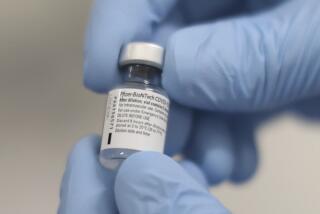Oral Vaccine for Traveler’s Diarrhea to Be Tested
- Share via
Reducing the risk of traveler’s diarrhea has never been foolproof.
The strategy most often recommended to people bound for high-risk countries is to avoid tap water--and ice--and to pass up raw fruits and vegetables.
Traveler’s diarrhea is caused by the consumption of contaminated food and beverages. It has been called a “bad hygiene” disease because it often is spread when cooks and other food handlers fail to wash their hands after bathroom visits.
On average, U.S. public health experts say, half of the Americans traveling in developing countries will suffer from traveler’s diarrhea. Even those who follow the dietary guidelines can get sick, especially in areas of high risk such as Africa and Latin America.
Soon there may be a better way to avoid this scourge. An oral vaccine to prevent the ailment is being studied by Dr. David Sack and his colleagues at the vaccine testing unit at Johns Hopkins University School of Hygiene and Public Health.
They recently got the go-ahead to test the vaccine in the field and are looking for volunteer subjects--400 people who plan visits of at least 21 days to Antigua, Guatemala, this summer.
Sack said that Antigua was chosen because of the popularity of its Spanish-language schools among North Americans. Many of the courses last at least three weeks.
The subjects will be randomly assigned to either the vaccine group or one receiving a placebo. The material will be mailed to them and they will self-administer it during a phone consultation with a university staffer. The first dose is taken three weeks before travel and the second dose one week before.
Participants will be paid $100 on arrival in Antigua and $300 upon completion of the study.
Traveler’s diarrhea usually lasts about four days and can include cramping and a mild fever. Vomiting may occur in severe cases. Dehydration can set in. The usual treatment is rehydration by drinking plenty of fluids. Antibiotics are sometimes prescribed.
The vaccine contains killed bacteria. It is designed to work by stimulating the production of antibodies against the bacteria that cause traveler’s diarrhea, known as enterotoxigenic Escherichia coli. These bacteria differ from E. coli 0157, the bacteria that made news in contaminated hamburgers.
In studies of the vaccine in Egypt, Sweden and Israel, Sack said, there have been no serious side effects. Those studies demonstrated that the vaccine is capable of stimulating antibody response to fight the disease, he said. The Johns Hopkins study is meant to determine if the vaccine can also prevent the disease.
Sack hopes to evaluate the study results by year’s end. It will probably be at least “a few years” before the vaccine is commercially available, he said.
Meanwhile, other researchers are investigating an edible vaccine to prevent traveler’s diarrhea. Researchers from the University of Maryland, Tulane University and the Boyce Thompson Institute for Plant Research in Ithaca, N.Y., reported last month in the journal Nature Medicine that 10 of the 11 subjects who ate bits of a genetically engineered raw potato developed defenses against traveler’s diarrhea. The potato contains a protein that activates the immune system against traveler’s diarrhea without causing the disease itself. (This is one of several edible vaccines being studied for various diseases.)
For more information on joining the Johns Hopkins study, contact the vaccine testing unit at (410) 955-0053.
Arrangements must be made at least three weeks before departure. Participants must be at least 18 years old and not pregnant. People who have traveled in high-risk areas in the past three years are not eligible because they may have already acquired antibodies.
Healthy Traveler appears the second and fourth week of every month.
More to Read
Sign up for The Wild
We’ll help you find the best places to hike, bike and run, as well as the perfect silent spots for meditation and yoga.
You may occasionally receive promotional content from the Los Angeles Times.






